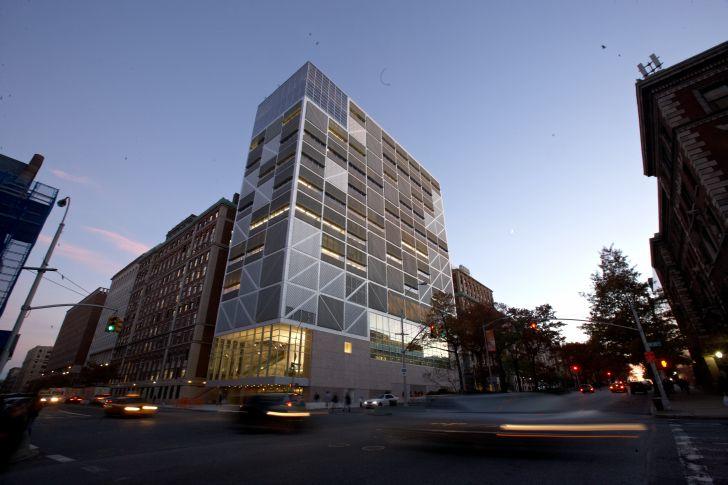Towering achievement
Columbia’s new science and engineering building, the Northwest Corner Building, has won a Merit Award for excellence in architecture from the Society for College and University Planning (SCUP).
The 14-story glass and aluminum structure, designed by the Spanish architect José Rafael Moneo, is a “magnificently detailed building with superb proportions and public spaces of highest quality,” according to a SCUP statement. “Light in the building is unbelievable . . . This is 5-star architecture.”
Van Amson to lead CAA
George L. Van Amson ’74CC, a managing director of Morgan Stanley and a Columbia University trustee emeritus, is expected to be confirmed as the head of the Columbia Alumni Association (CAA) on October 22.
As the chair of the CAA, Van Amson will oversee the University’s broadest alumni network, which connects nearly 300,000 Columbians from all schools through more than 80 regional clubs and affinity groups, online resources, and hundreds of events each year. In this role, he will succeed James Harden ’78BUS, ’83PH, who became chair of the CAA in 2008.
Van Amson, after graduating from Columbia with an economics degree, worked as a financial analyst at Citibank and Goldman Sachs before joining Morgan Stanley as a vice president in 1992.
He currently sits on the board of Community Impact, a Columbia-based nonprofit organization that serves disadvantaged people in and around Morningside Heights.
New names on the board
The University Trustees recently welcomed three new board members: Rolando T. Acosta ’79CC, ’82LAW; Fiona Druckenmiller ’84BC; and Jonathan Lavine ’88CC.
Acosta is an associate justice of the New York State Supreme Court and previously worked as an attorney for the Legal Aid Society, a nonprofit that provides representation to low-income New Yorkers. A star pitcher for the Lions in the 1970s, Acosta had offers to play professional baseball but opted to attend Columbia Law School. He has served on the boards of the College’s and the law school’s alumni associations.
Druckenmiller is a former portfolio manager at the Dreyfus Corporation. With her husband, Stanley, she heads the charitable Druckenmiller Foundation, which has supported medical research, education programs, and antipoverty initiatives.
Lavine is a managing director at Bain Capital. He serves there as the managing partner and chief investment officer of Sankaty Advisors, Bain Capital’s fixed-income and credit affiliate, which he founded in 1997. Lavine is also the chair of the Columbia College Board of Visitors.
Earlier this year, longtime trustees Stephen Case ’64CC, ’68LAW and Savio Tung ’73SEAS stepped down from the University’s board.
Pathway to public-health careers
Columbia University Medical Center has received a five-year, $3.7 million federal grant to create a program that will encourage minority undergraduates to pursue careers in public health and biomedical science.
The Summer Public Health Scholars Program will train 50 students each year from community colleges, four-year colleges, and postbaccalaureate programs. Participants, over the course of the 10-week program, will shadow public-health professionals and take courses on subjects such as epidemiology and health-care disparities.
The program, funded by the Centers for Disease Control and Prevention, will be led by obstetrician Hilda Hutcherson, a clinical professor at the College of Physicians and Surgeons and an associate dean in charge of that college’s office of diversity.
Quantum visions
Dirk Englund, an assistant professor of electrical engineering and applied physics, has been awarded the Presidential Early Career Award for Scientists and Engineers, which includes $500,000 in research funding to be used over five years.
Englund, a leader in the emerging fields of chip-based quantum optics and nanophotonics, addresses problems in communications, computation, sensing, and information technology. His research team at Columbia Engineering’s Quantum Photonics Group has drawn upon the lessons of quantum mechanics to develop new technologies for processing information and making precision measurements.
In memoriam: Fu, Weatherhead
Shanghai-born businessman Z. Y. Fu, who in 1997 gave $26 million and his name to Columbia’s engineering school, died in August at the age of 90.
Fu became acquainted with Columbia through his brother-in-law, Chia-Kun Chu, who taught applied mathematics here beginning in the 1960s and is today a professor emeritus at the Fu Foundation School of Engineering and Applied Science. At the time of his naming gift, Fu told the engineering school’s magazine, “I wish to ensure that Columbia will continue to grow as an international leader in science and technology.”
Another major Columbia benefactor, the industrialist and philanthropist Albert J. Weatherhead III, died on September 20 at the age of 86.
Weatherhead, too, had fraternal associations with the University, through his younger brother, Richard W. Weatherhead ’66GSAS. Following Richard’s early death, Albert created Columbia’s Weatherhead Fund in his brother’s honor in 1980. The Weatherhead East Asian Institute was named in the family’s honor in 2003, in recognition of the fund’s role in supporting its postdoctoral fellowships, visiting professorships, faculty research program, graduate training grants, student internships, and resident fellows program.



